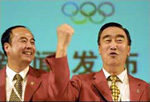 |
BEIJING WINS 2008 SUMMER OLYMPIC GAMES

Beijing Wins Bid for Hosting 2008 Olympic Games
The International Olympic Committee (IOC) awarded the 2008 Olympic Games to Beijing in Friday's vote during Juan Antonio Samaranch's last IOC session as president.
The attraction of staging the Games in a country which has the world's largest population, as well as huge economic potential, won the IOC's heart.
Out of 122 IOC members, 105 voted in Friday's secret ballot that ended after second round when Beijing collected a winning majority of 56 votes.
Toronto finished a distant second with 22 votes, followed by Paris on 18 and Istanbul on 9.

BEIJING WINS 2008 SUMMER OLYMPIC GAMES
Osaka was eliminated on 6 votes in the first round, in which Beijing garnered 44 votes, Toronto 22, Istanbul 17 and Paris 15.
Thirteen IOC members from the countries of candidate cities were not allowed to vote. Samaranch couldn't vote either.
Judge Keba Mbaye from Senegal, the chief tally of the 1993 ballot in which Beijing lost to Sydney by two votes, scrutinized Friday's vote along with IOC vice president Thomas Bach of Germany and Francisco Elizalde of the Philippines.
After sitting out the contest for the 2004 Games, which were awarded to Athens, Greece, Beijing came back this time with a new and improved bid.
With the motto "New Beijing, Great Olympics", Beijing promises to host a "Green Olympics, a "Hi-tech Olympics" and a "People's Olympics".
The 3,000-year-old city is ready to become a truly international city and showing a new, vigorous image through its ongoing economic reforms.
To many Olympic observers, Beijing's case for the Games is simple: China is home to a fifth of the world's population but never has hosted the Olympics. It is also an international sports giant, finishing third in medals at last year's Sydney Games. And it is a largely untapped market for the products of corporate sponsors.
Beijing enjoys the most popular support among the five bidding cities. An independent Gallup opinion poll showed 94.9 percent of the public in favor of it. The IOC's own surveys found support even higher.
By comparison, only about two-thirds of the public in France backed the Paris bid; Canadians expressed about the same amount of support for Toronto's bid.
The Beijing bid has been endorsed by world known athletes like Kenya's five-time world cross-country champion, Paul Tergat, Australia's most prominent Aboriginal sports figure, Cathy Freeman, one of the table tennis all-time greats, Jan-Ove Waldner from Sweden.
The Chinese government has pledged to spend 20 billion U.S. dollars building sports complexes and refurbishing the Beijing infrastructure. There are plans for a new exhibition center with twin skyscrapers that could be taller than any in the world.
About 3.7 billion U.S. dollars will go to ease traffic, tripling the length of the city's highways and quadrupling the capacity of its subway system.
In addition, about 400 million U.S. dollars has been earmarked to upgrade the health care system, and city officials want to pour another 400 million U.S. dollars into communications and technology infrastructure.

In This Section

|